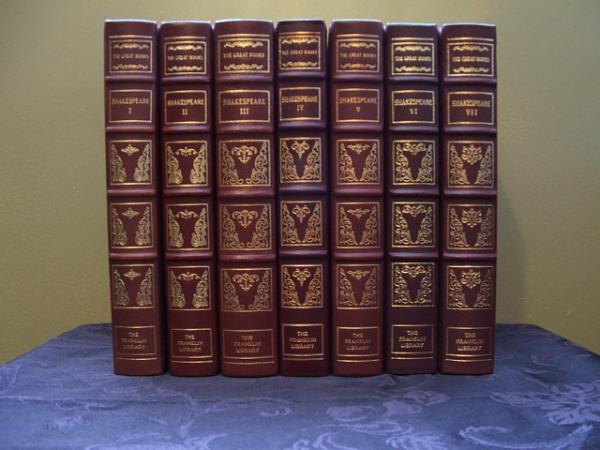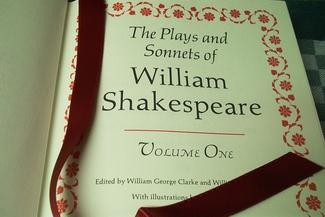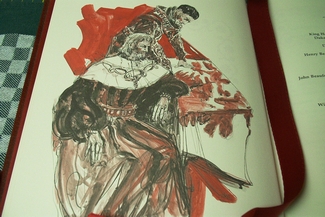Easton Press William Shakespeare books
A Midsummer Night's Dream - The Collector's Library of Famous Editions - 1967
The Comedies - 100 Greatest Books Ever Written - 2008
Midsummers Night's Dream - 100 Greatest Books Ever Written - 2008
Romeo and Juliet - 100 Greatest Books Ever Written - 2008
The Complete Works in 39 Volumes, including titles:
King Lear
Titus Andronicus
Twelfth Night
The Taming of the Shrew
The Comedy of Errors
Much Ado About Nothing
Anthony and Cleopatra
The Tempest
Timon of Athens
Julius Caesar
Troilus and Cressida
As You Like It
Macbeth
All's Well That Ends Well
The Two Gentlemen of Verona
The Winter's Tale
Coriolanus
The Merchant of Venice
Pericles
Othello
Measure for Measure
King John
A Midsummer Nights Dream
Romeo and Juliet
The Poems of William Shakespeare I
The Poems of William Shakespeare II
Cymbeline
Hamlet
Love's Labour's Lost
The Merry Wives of Windsor
Henry the Fourth I
Henry the Fourth II
Henry the Fifth
Henry the Sixth I
Henry the Sixth II
Henry the Sixth III
Henry the Eighth
Richard the Second
Richard the Third
Shakespeare of London - Marchette Chute - 1988
Tales From Shakespeare - Charles and Mary Lamb - 1996
Franklin Library William Shakespeare books
Six Tragedies - 100 Greatest Books of All Time - 1975Works of William Shakespeare - Great Books of the Western World - seven volumes 1978 to 1983
Poems - World's Best Loved Books - 1980
Poems - 100 Greatest Books of All Time - 1980
Six Histories - 100 Greatest Books of All Time - 1981
Six Tragedies - World's Best Loved Books - 1982
Seven Comedies - World's Best Loved Books - 1983
William Shakespeare biography
William Shakespeare, often regarded as the greatest playwright in the English language and the world's pre-eminent dramatist, was born in Stratford-upon-Avon, England, in April 1564. He was the third of eight children born to John Shakespeare, a prominent local figure, and Mary Arden, the daughter of a wealthy landowning farmer. Little is known about Shakespeare's early life, but it is believed that he attended the local grammar school, where he would have received a classical education in Latin literature. By 1582, at the age of 18, Shakespeare married Anne Hathaway, with whom he had three children: Susanna, and twins Hamnet and Judith.Shakespeare's life took a significant turn when he arrived in London in the late 1580s or early 1590s. There, he found work as an actor and playwright in the thriving theatrical scene of Elizabethan England. He quickly established himself as a successful playwright, poet, and actor, becoming a shareholder in the theatrical company known as the Lord Chamberlain's Men, which later became the King's Men under King James I's patronage. Over his career, Shakespeare penned numerous plays that encompassed a wide range of genres, including comedies, tragedies, and histories. His works are known for their intricate plots, rich language, and profound insights into the human condition. Some of his most famous plays include Romeo and Juliet, Hamlet, Macbeth, Othello, King Lear, and A Midsummer Night's Dream.
Shakespeare's legacy extends far beyond his lifetime. His works have been translated into every major language and are performed more often than those of any other playwright. His influence on literature, theatre, and the English language itself is immeasurable, with countless phrases and expressions from his works still in common usage today. Despite his immense popularity and success, much of Shakespeare's personal life remains shrouded in mystery. Scholars have debated various aspects of his biography, including his religious beliefs, his sexuality, and the authorship of his plays. Nevertheless, William Shakespeare's enduring legacy as a master storyteller and wordsmith continues to captivate audiences around the world, ensuring that his works will be cherished for generations to come.
Hamlet
Hamlet is one of his most famous tragedies, believed to have been written between 1599 and 1601. The play follows Prince Hamlet of Denmark as he grapples with grief, revenge, and the complexities of human existence. After his father, the King, dies under suspicious circumstances and his mother quickly marries his uncle, Hamlet is visited by the ghost of his father, who reveals that he was murdered by his brother, Claudius. Haunted by his father's ghostly command to avenge his death, Hamlet embarks on a journey of deception and moral conflict, feigning madness to uncover the truth and bring justice to his family. As the plot unfolds, Hamlet's internal struggles lead to a series of tragic events, ultimately culminating in a climactic and devastating conclusion that leaves few survivors. Hamlet is celebrated for its exploration of themes such as madness, mortality, and the nature of truth, as well as its complex characters and timeless insights into the human condition.
Hamlet is celebrated for its exploration of themes such as revenge, madness, and the uncertainty of existence. Shakespeare's masterful use of language, complex characters, and intricate plot have made the play a cornerstone of Western literature and a source of inspiration for countless adaptations and interpretations. Through Hamlet's introspective journey and his iconic soliloquies, the play delves into the depths of the human psyche, offering timeless insights into the complexities of the human condition.
Macbeth
Macbeth is a compelling tale of ambition, power, and moral downfall. Set in Scotland, it tells the story of Macbeth, a brave and loyal general who receives a prophecy from three witches that he will one day become king. Encouraged by his ambitious wife, Lady Macbeth, Macbeth is consumed by the desire for power and sets out on a path of treachery and murder to fulfill the prophecy. As he ascends to the throne through deceit and violence, Macbeth's guilt and paranoia grow, leading to a descent into madness and self-destruction. The play explores themes of fate, ambition, guilt, and the corrupting influence of unchecked ambition. Macbeth remains one of Shakespeare's most enduring and widely performed works, renowned for its vivid characters, atmospheric setting, and timeless exploration of the human psyche.
This shocking tragedy (a
violent caution to those seeking power for its own sake) is, to this
day, one of Shakespeare’s most popular and influential masterpieces.
Romeo and Juliet
Romeo and Juliet is a tragic play written around 1595. Set in Verona, Italy, it tells the story of two young lovers from feuding families, the Montagues and the Capulets, whose romance ultimately ends in tragedy. The play begins with a street brawl between members of the two households, setting the stage for the deep-seated animosity between the families. Despite the ongoing feud, Romeo Montague attends a Capulet ball in disguise, where he meets and falls in love with Juliet Capulet. Their instant connection leads to a whirlwind romance, and they secretly marry the next day. However, their happiness is short-lived as tensions between their families escalate. Romeo is banished from Verona for killing Juliet's cousin Tybalt in a duel. To avoid an arranged marriage to another man, Juliet takes a potion that simulates death, planning to reunite with Romeo once she awakens. However, Romeo, unaware of the plan, believes Juliet is truly dead and takes his own life beside her.
When Juliet awakens to find Romeo dead, she takes her own life in grief. Their tragic deaths finally reconcile the feuding families, but at a heartbreaking cost.
Romeo and Juliet is renowned for its exploration of themes such as love, fate, and the consequences of violence. Shakespeare's poetic language, complex characters, and poignant storytelling have ensured its enduring popularity and status as one of the greatest love stories ever told.
The Tempest
The Tempest, believed to be one of William Shakespeare's final plays, is a captivating tale of magic, betrayal, and redemption. Set on a remote island, the story follows Prospero, the rightful Duke of Milan, who has been exiled and marooned with his daughter Miranda by his treacherous brother Antonio. Using his mastery of the mystical arts, Prospero conjures a tempest that shipwrecks his enemies, including Antonio, onto the island. Through a series of enchantments and manipulations, Prospero seeks to restore his rightful place and orchestrate the union of his daughter with Ferdinand, the son of Alonso, King of Naples. Alongside these central characters are the island's other inhabitants: the ethereal spirit Ariel and the monstrous Caliban, whose complex relationships with Prospero add depth and intrigue to the narrative.
The Tempest explores themes of power, forgiveness, and the transformative power of art. As the play unfolds, characters confront their past wrongdoings and grapple with questions of identity and agency. Ultimately, The Tempest concludes with a resolution that is both poignant and redemptive, highlighting Shakespeare's masterful storytelling and profound insights into the human condition.
King Lear
King Lear, one of William Shakespeare's greatest tragedies, delves into the themes of power, family, and madness. The play centers around the aging King Lear's decision to divide his kingdom among his three daughters based on their declarations of love for him. However, when his youngest and most beloved daughter, Cordelia, refuses to flatter him with false declarations, Lear banishes her, setting off a chain of events that leads to chaos and tragedy. As Lear's mental state deteriorates, he becomes increasingly vulnerable to the machinations of his deceitful older daughters, Goneril and Regan, ultimately leading to his downfall and the destruction of his entire family.
Throughout King Lear, Shakespeare explores the complexities of human relationships and the consequences of pride and folly. The play's rich language, intricate plot, and unforgettable characters, including the loyal Earl of Kent, the scheming Edmund, and the Fool, provide a compelling exploration of power dynamics and the fragility of human nature. King Lear remains a timeless masterpiece, celebrated for its profound insights into the human condition and its enduring relevance across generations.
Othello
Othello is a gripping tale of jealousy, manipulation, and betrayal. Set against the backdrop of Venetian society, the play follows the noble Moorish general Othello, who elopes with the beautiful Desdemona, much to the displeasure of her father, Brabantio. Their happiness is short-lived, however, as the conniving ensign Iago sets out to destroy Othello's life out of spite and envy. Through a web of deceit and deception, Iago poisons Othello's mind with false suspicions of Desdemona's infidelity, leading to a tragic chain of events that culminates in devastating consequences for all involved. Othello is a timeless exploration of the destructive power of jealousy and the vulnerability of trust, showcasing Shakespeare's unparalleled talent for crafting compelling characters and exploring the depths of the human soul.A Midsummer Night's Dream
A Midsummer Night's Dream, a comedy by William Shakespeare, is a whimsical tale of love, magic, and mischief set in ancient Athens and the enchanted forest. The play intertwines the stories of several groups of characters: the Athenian nobleman Theseus and his bride Hippolyta; Hermia, Lysander, Demetrius, and Helena, caught in a tangled love quadrangle; and a group of amateur actors led by the hapless Bottom. When the mischievous fairy Puck intervenes with a love potion, chaos ensues as romantic affections are altered and confusion reigns. Amidst the magical interventions and humorous misunderstandings, the play explores themes of love's irrationality, the fickleness of desire, and the transformative power of imagination. A Midsummer Night's Dream captivates audiences with its enchanting blend of romance, comedy, and fantastical elements, showcasing Shakespeare's ability to craft captivating stories filled with wit, humor, and whimsy.William Shakespeare quotes
"To be, or not to be, that is the question." - Hamlet
"All the world's a stage, and all the men and women merely players." - As You Like It
"Love all, trust a few, do wrong to none." - All's Well That Ends Well
"The course of true love never did run smooth." - A Midsummer Night's Dream
"If music be the food of love, play on." - Twelfth Night
"What's in a name? That which we call a rose by any other name would smell as sweet." - Romeo and Juliet
"The better part of valor is discretion." - Henry IV, Part 1
"All that glisters is not gold." - The Merchant of Venice
"Cowards die many times before their deaths; the valiant never taste of death but once." - Julius Caesar
"We are such stuff as dreams are made on, and our little life is rounded with a sleep." - The Tempest



No comments:
Post a Comment
Share your best book review and recommendation